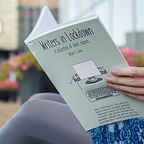Book Review: Upon this Rock, by David Marusek
The blurb is an honest and accurate summary, so I’ll repeat it here: “An epic new science fiction series about family, faith and alien invasion in the wilds of Alaska.”
I under-estimated and miscategorised this book on first impression, thinking this could turn out to be a religion-steered message hidden within a science fiction book, i.e. a “what if” wish-fulfilment fantasy where the Christians turn out to be right. That assumption was based on the narrow minded believer character introduced near the start and also some mention of angels and the end of days. What it turned out to be is a good mainstream adventure which includes an obsessed faith character and the poor family he drags around Alaska with him. This man thinks scripture will give him all the answers but that’s a layer of illusion that he accepts and the reader doubts, so we can’t immediately see what’s going on and who is pulling the strings. There are plenty of other characters who aren’t bugbears and do think in mainstream secular ways, which provides the counterpoint to set his family apart from both the average joe and other churchgoing folk.
The reason the story needs that sort of character is because it makes for an interesting story to drop a seemingly alien artefact into this character’s path and see how he dances, what belief interpretation he places upon it. Yes, of course he knows he is right (because he’s mad) but here at last is evidence that the world must accept that he’s right and they’re all wrong. This intervention, this stone plopping into the pond trips a sequence of behaviour which propels the events of the story. If the apocalypse is nigh, the rules and laws no longer matter, do they? It all makes sense to the protagonist but to the rest of us it’s getting crazy.
Interestingly, an alternately-minded individual would think “Aliens! The only possible conclusion!”, using exactly the same erratic object/evidence to validate a conclusion that’s totally different; and thus reveal their own susceptibility to an equally valid/invalid belief system. A paranoid person might be convinced it’s the UN spying on our minds. In other words, as humans, we spot patterns in everything and adapt our behaviour to that pattern. If it fits multiple patterns or theories, people regularly do the wrong thing and settle on one based on their prejudices, then only see what they want to see. When crowds do this, it can become lethal.
The mystery is therefore whether the sudden intrusion into our world is aliens, angels & devils, hallucination or simply secret government stuff that’s dropped off a satellite. Who knows? When a representative of one of the above cultures turns up, we are supposed to wonder if they are the real deal or something quite different that’s just telling people what they want to hear. My shallow reading of psychology flipped my guesses well off the mark. Why, for example, would any external influence’s point of contact with humanity be so flawed? Couldn’t they do better? Even the main character’s lawyer seemed to have so much more about him, so many layers that hadn’t surfaced.
I liked reading about life in a national park in Alaska, land grabbing, seasonally migrating communities and how people living in that state don’t feel secure that their supply lines are at the mercy of their larger neighbour. I also got deeply into the characters and how they interacted (badly) with their opposing views of the world and how we should live. The belief angle was inter-cut with a lot of doubt, so that worked well. Generally, it was well written, gave me insight into another approach with its flaws and benefits, posed some puzzling questions and I liked it, which was unexpected. I think the story would have read better if it was condensed by about a hundred pages but even that served to convey the feeling of being in a setting where things unfold at their own pace, where there’s more time to enjoy your surroundings and take it all in. The winters are hard, the summers are majestic and life is somehow more real than common urban existence where people don’t really live, just burden themselves with constraints and dream of a day far in the future where they will be able to escape — and briefly live for about two years when their life force is spent. The alternative view, to ignore rules and responsibility, live for now and instead put our trust in the supernatural is a pleasingly alternative way to behave insanely. In both lifestyles, reality catches up.
Altogether, an impressive book that should have been tragic but wasn’t, should have had a solid explanation but didn’t, suggested it would conform to an opinionated stereotype but was confounding enough not to, all puzzles, questions and enigmas dragged through pine-scented snow.
